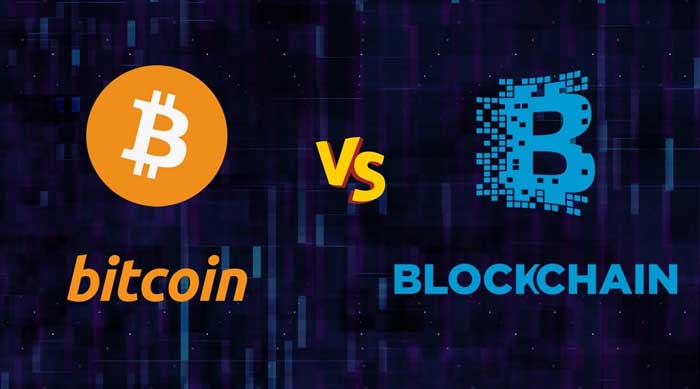As a result, the words “blockchain” and “cryptocurrency” are commonly used interchangeably. While they may seem similar, there is a significant distinction between the two. Cryptocurrencies are a kind of digital currency that uses the distributed ledger technology known as blockchain to record financial transactions. Blockchains are most known for their usage with digital currencies, but they also have a wide range of non-financial applications. To find out which coins are worth investing in, read more here.
Definition of Blockchain

An electronic database consisting of a chain of records, similar to a spreadsheet. As opposed to a traditional spreadsheet, a blockchain can store and manage far bigger datasets, such as records of bitcoin transactions, by organizing this data into blocks.
These blocks exist in what is known as a “distributed ledger,” which is a network of computers. When a block’s capacity is reached, it is “chained” to an already-full block and a new block is added to the system.
And Cryptocurrency, What is it?

Cryptocurrency is a kind of digital currency that can be bought and sold on the open market. Similarly to gold, cryptocurrency may be kept as a hedge against inflation. Bitcoin was the first cryptocurrency and the first use of blockchain technology.
After Bitcoin’s success, other digital currencies like Ether developed their own blockchain technologies (known as Ethereum).
Blockchain and Cryptocurrency Similarities

Intangible
The blockchain and digital currency are both immaterial concepts. There is no physical representation for a cryptocurrency as there is for the US money or the Indian rupee. Blockchains, which are used to store cryptocurrency transactions, are not located in a central data hub.
Advanced
Coincidentally, blockchain and digital currency are both examples of cutting-edge IT. Coins and tokens are only as secure as the technology that supports them, and blockchain is that technology. Blockchain is a more modern and safe alternative to outdated database systems. Cryptocurrencies are more sophisticated technologically than traditional currencies such as paper bills.
Interdependent
Bitcoin is the first cryptocurrency, and blockchain was developed specifically to track its monetary transactions. The transaction histories of the most popular cryptocurrencies may be found on blockchains. When someone purchases bitcoin, the transaction is recorded on a public ledger called a blockchain.
The Key Distinctions Between Blockchain and Cryptocurrencies

Nature’s Inheritance
The blockchain is a distributed ledger system used to store information. Cryptocurrency, like the dollar, may be used as a means of trade. The bitcoin industry isn’t the only one that can benefit from a blockchain’s versatile data storage capabilities.
Monetary worth
Bitcoin, Ethereum, and every other cryptocurrency all have their own individual worth. You’ve probably heard that the price of a bitcoin reached $65,000 (about 48 million rupees) or that the price of an Ether token reached $4,000 (roughly 32 million) (about 3 lac rupees). A block on a chain does not represent anything of value.
Usage
The blockchain’s potential applications go well beyond the financial sector. Financial, medical, logistics, and retail sectors may all benefit from using blockchain to record transactions. A cryptocurrency is a kind of digital currency that may be used to make financial transactions or be saved for future usage.
Mobility
Blockchain is a distributed ledger system that does not rely on any central authority or server. All blocks in a blockchain are kept decentralized among several computers. Cryptocurrencies are stored on distributed ledgers, but they may be accessed using mobile wallets. You may use your bitcoin wallet to make purchases from anybody who accepts bitcoins.
Transparency
Since it is a public ledger, blockchain provides unparalleled clarity. It is possible for anybody to join a blockchain system and access the data stored there. On the other hand, cryptocurrency transactions may be made in secret. Anyone may thus see the origin and destination of a bitcoin transaction, but nobody can learn who initiated it.







